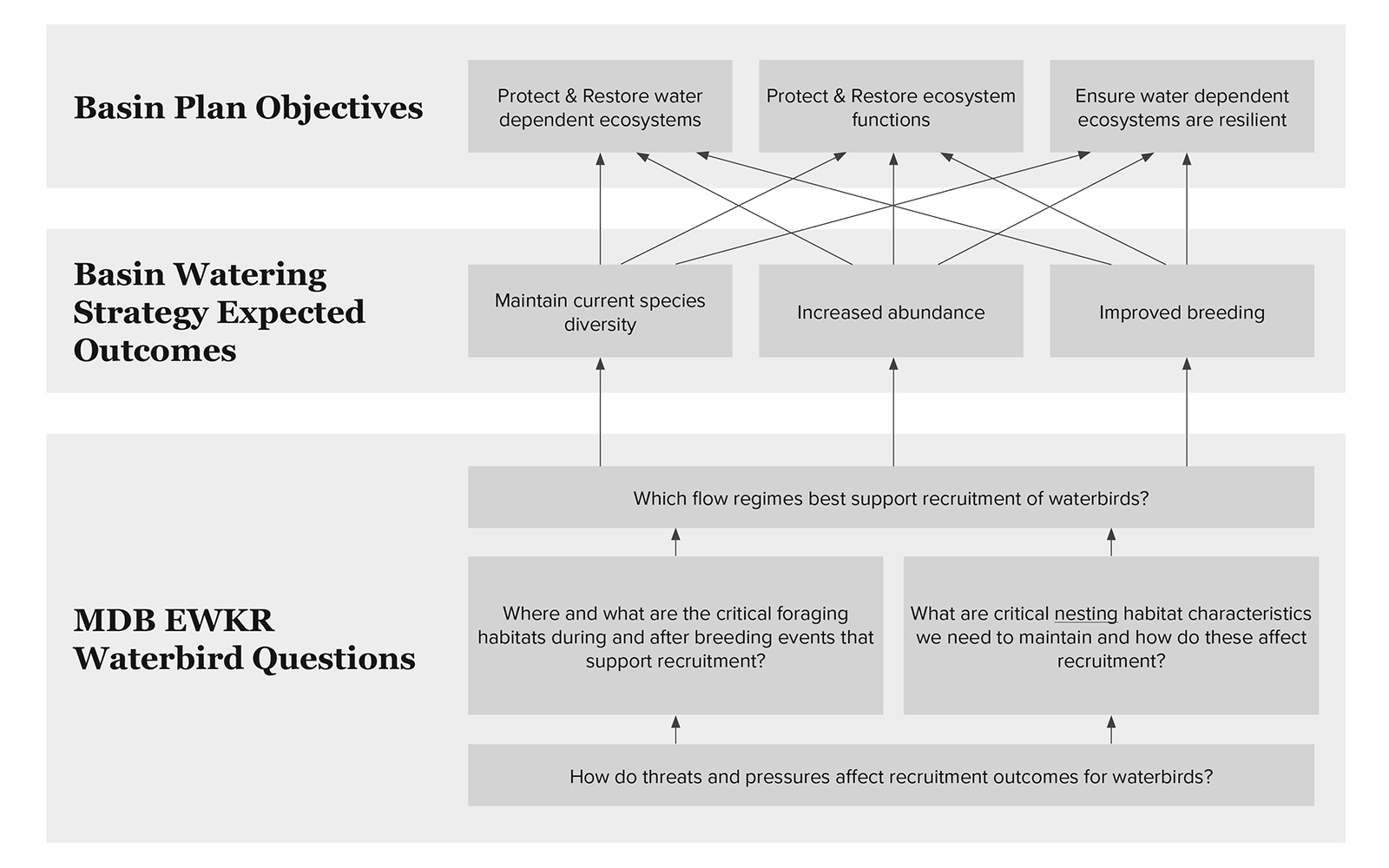
When we talked to water managers about waterbirds, they wanted to know more about the habitats that provide food for growing chicks and newly fledged juveniles, and how flows can boost and support these habitats. They also wanted more information about site choices, nest success and recruitment, and how best to manage nesting habitats.
As a result of these discussions we are investigating the influence of flow regimes on waterbird recruitment (chick to adulthood). We want to maximise the recruitment of young waterbirds into the adult population, and this depends on the number of healthy chicks that fledge from each nesting colony. Breeding success relies on water managers protecting and maintaining nesting habitats between and during floods. We are focusing our attention on colonial-breeding waterbirds such as ibis and spoonbills because they are important species for water management, are easily surveyed, and have known breeding locations. Between them, they represent a range of feeding and nesting habitats, and are considered to be a reasonable model for other waterbirds in the Basin.
How our waterbird work fits within the Basin Plan:

Application
The Waterbirds research program helps managers to identify, maintain or restore key habitats, and better understand the scale of habitats and environmental flows that are required for successful breeding, and for survival of juveniles and adults between breeding events. It is producing practical information for better managing water, vegetation and feral animals, to ensure ‘event readiness’ at nesting sites during and between floods to maximise recruitment. The research is also identifying key nesting habitats and foraging sites, and equipping managers with the information they need to maintain or restore them.
Additional stories worth exploring are linked below.
Our MDB EWKR Waterbird Team:
| Team Members | Biography |
| Heather McGinness Waterbird Theme Coordinator CSIRO Heather.Mcginness@csiro.au |
Dr McGinness is an Ecologist who conducts research aiming to inform sustainable natural resource management practices. With a background in riverine and floodplain landscape ecology, her interdisciplinary work integrates aquatic and terrestrial ecology in a range of agricultural, mixed and natural ecosystems. Research areas include the effects of changes in landuse, hydrology and flooding upon biodiversity and productivity; the ecological influence of variability and connectivity in river systems and their catchments; and the adaptive management and rehabilitation of ephemeral creeks, floodplains and wetlands in multi-use landscapes. http://people.csiro.au/M/H/Heather-Mcginness |
| Ralph MacNally University of Canberra Ralph.MacNally@canberra.edu.au |
Ralph Mac Nally is a world leader in whole-of-catchment ecology. No other Australian has contributed so much to the understanding of summit-to-sea ecology as he by integrating thinking and fundamental research on terrestrial, freshwater, floodplain and estuarine ecosystems. He has led the seamless assimilation of large-scale experiments, extensive survey programs and sophisticated spatial modelling to erect and test hypotheses on the factors that control patterns of biodiversity and ecological processes in ways that have been intractable previously. Mac Nally has developed these approaches to understand and predict the consequences of climate and land-use change at continental and decadal scales. http://appliedecology.edu.au/people/professor-ralph-mac-nally/ |
| Veronica Doerr CSIRO Veronica.Doerr@csiro.au |
Dr Doerr has extensive experience observing bird behaviour, with more than 20 years of experience conducting ecological field research with an emphasis on birds, but also in the context of their habitat, including vegetation surveys. Her PhD degree is in Ecology, Evolution and Conservation Biology from the University of Nevada-Reno. Her role in the project is to help develop the Research Work Plan and provide advice to ensure surveys and analyses are conducted in both scientifically and ethically appropriate manners. |
| Richard Kingsford University of NSW Richard.kingsford@unsw.edu.au |
Richard is one of Australia’s best known freshwater ecologists. Richard is currently Director of the Centre for Ecosystem Science at the University of NSW where he continues to undertake research on river and wetland ecology, waterbirds and the impacts of management. |
 The EWKR Waterbird theme is led by the Commonwealth Scientific and Industrial Research Organisation (CSIRO).
The EWKR Waterbird theme is led by the Commonwealth Scientific and Industrial Research Organisation (CSIRO).